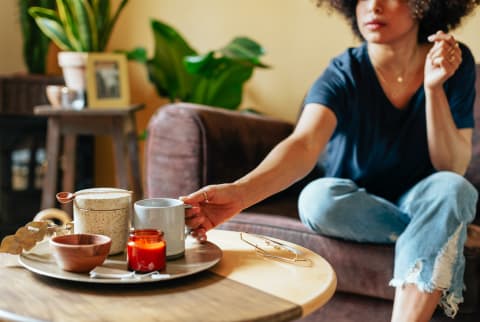Advertisement
The Best Herbs To Keep On Hand For Digestion, Sleep & More


Some people drink tea for the taste, others for the plentiful well-being benefits. Each cup packs a unique portfolio of health perks, so it can be hard to determine which herbs to prioritize for your unique health goals.
To come, an herbalist's advice for keeping your tea and herb shelf stacked with the basic must-haves for optimal digestion, relaxation, and more:
Ginger shots or ginger tea
First up, we have ginger. As herbalist William Siff, L.Ac, tells mbg, this root is called "The universal medicine," in Ayurveda, and for a good reason.
"It's so widely applicable for so many health concerns, and it's well tolerated by pretty much everyone in every age group," he adds.
Having ginger in any form before a meal can be beneficial. The spicy root brings blood circulation1 to the organs that will be breaking down your food, Siff explains. So, in a way, it's priming your digestive system for the food that is about to come. This, he says, can help ease bloating and digestive upset—especially if you're eating a larger or heavier meal than you normally do.
In fact, ginger has been shown to ease gastrointestinal pain in clinical studies2, further confirming the benefits.
Deciding which form is best for you depends on what you're looking for and how your stomach tolerates it. While ginger is soothing for most people, taking a super-strong ginger shot might not feel the best going down for everyone, especially if you already ate something spicy. In those cases, opt for the gentler form of ginger tea.
Having ginger in tea form is also just great for digestion maintenance. Raw ginger or ginger shots may be better to have before a big meal as they pack just a bit more heat, he says. If you despise the taste of ginger at all, try mixing it into your meals via ground ginger or tossing a small thumb in your smoothie to help mask the strong taste.
Digestive bitters & detoxifying herbs
"The digestive system can be seen like two sides of one coin," Siff explains. In one way, you want to extract the nutrients from your food (which is where ginger may help). But then, you have the second phase of digestion, where waste is removed—here's where he recommends incorporating digestive bitters and detoxifying herbs.
Most people don't consume bitter tastes that often, Siff say (unless you're a black coffee drinker), so adding digestive bitters can be an easy way to check this box.
Digestive bitters typically come in liquid form that you can drop onto your tongue or in a drink. These products generally contain an alcohol or vinegar base in addition to other detoxing herbs like dandelion root, burdock root, artichoke leaf, bitter melon, woodworm, licorice root, and so on.
Siff deems dandelion one of the best detoxifying herbs to consider. This root has been shown to support liver health3 and help release extra water weight4 as well and can be taken in tincture or tea form.
The way bitter herbs support digestion is by stimulating reflexes on the tongue to create salivation, which triggers an increase in digestive 5secretions that help your body remove waste—pretty cool, right? If you want to skip the bitters, steep a cup of tea with some bitter herbs instead.
Nervous system soothers
Your nervous system plays a role in a number of health concerns, Siff says, from anxiety and depression to poor sleep and beyond, so it's important to tend to it often. One way to do this is by sipping relaxing tea throughout the day.
Herbs to look for include:
- Peppermint
- Chamomile
- Lemon balm
- Valerian
- Spearmint
- Lavender
Siff notes that consistency is very key with these herbs and drinking one cup every once in a while won't bring nearly as much benefit as making it a daily ritual.
The relaxing power these herbs have on the body may even translate to better digestion as well, especially in terms of constipation, Siff says. The more relaxed you are physically and mentally, the easier it will be for your body to work in rhythm.
For every type of tea above, make sure to double-check the steeping time to ensure you don't under- or overdo it for optimal benefits and flavor.
The takeaway
Looking to build out your healthy tea and herb collection? An herbalist recommends getting started with ginger for aiding in food breakdown and immune support, bitter herbs like dandelion and licorice root for detoxification, and relaxing blends with lavender or chamomile. Once you have your teas, here's how long you can expect them to stay fresh.